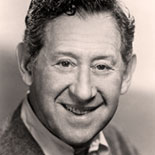 Jack Gilford (July 25, 1907 – June 4, 1990) was an American Broadway, film and television actor.
Jack Gilford (July 25, 1907 – June 4, 1990) was an American Broadway, film and television actor.
Gilford was born Jacob Aaron Gellman on the Lower East Side of Manhattan and grew up in Williamsburg, Brooklyn. His parents were Romanian-born Jewish immigrants Sophie “Susksa” (née Jackness), who owned a restaurant, and Aaron Gellman, a furrier. Gilford was the second of three sons, with an older brother Murray (“Moisha”) and a younger brother Nathaniel (“Natie”).
In 1938, Gilford worked as the master of ceremonies in the first downtown New York integrated nightclub, “Cafe Society” owned and operated by Barney Josephson. He was a unique blend of the earlier style of the Yiddish theater, vaudeville and burlesque, and started the tradition of monology such as later comedians Lenny Bruce and Woody Allen used. He won numerous industry awards.
One of Gilford’s specialties was pantomime, and this talent was put to good use by director George Abbott when he cast Gilford as the silent King Sextimus in Once upon a Mattress (Off-Broadway, 1959). Gilford shared the stage with a young Carol Burnett in this production, and reprised his performance with her in two separate televised versions of the show, in 1964 and in 1972.
Gilford and his wife were called to testify before the House Un-American Activities Committee in 1953. The couple had difficulty finding work during much of the rest of the 1950s due to the Hollywood blacklist. The couple often had to borrow money from friends to make ends meet. He found work towards the end of the 1950s and during the early 1960s with the end of the McCarthy era. He made his comeback as Hysterium in the 1962 Broadway musical A Funny Thing Happened on the Way to the Forum. He co-starred in the play with his close friend, Zero Mostel, who was also blacklisted during the McCarthy era. Ironically, this particular production was also choreographed by Jerome Robbins, who had previously testified before HUAC in 1953.